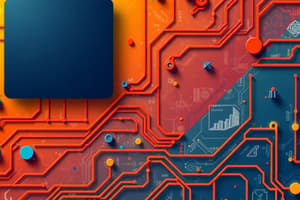Podcast
Questions and Answers
Which of the following best describes the role of an Operating System in a computer system?
Which of the following best describes the role of an Operating System in a computer system?
- Provides a user interface for interacting with hardware.
- Manages and controls hardware resources.
- Executes applications and programs.
- All of the above (correct)
What is the primary function of Abstraction in the context of operating systems?
What is the primary function of Abstraction in the context of operating systems?
- To allocate system resources efficiently to multiple users and applications.
- To provide a layer of security between the user and the system resources.
- To optimize the performance of computer hardware.
- To simplify the complexity of computer hardware for users and applications. (correct)
Which of the following is NOT an example of Abstraction in an Operating System?
Which of the following is NOT an example of Abstraction in an Operating System?
- The command line interface, providing a text-based way to interact with the system. (correct)
- The virtual memory, providing a larger address space than the physical memory.
- The scheduler, managing and allocating CPU time to different processes.
- The file system, hiding the physical storage details.
In the context of a computer system, what does Arbitration refer to?
In the context of a computer system, what does Arbitration refer to?
Which of the following is NOT considered a key role of an Operating System in managing computer resources?
Which of the following is NOT considered a key role of an Operating System in managing computer resources?
How does Abstraction enable users to interact with a computer system more easily?
How does Abstraction enable users to interact with a computer system more easily?
What is the main advantage of using an Operating System?
What is the main advantage of using an Operating System?
Which of the following would NOT be considered an abstraction provided by an operating system?
Which of the following would NOT be considered an abstraction provided by an operating system?
Which of the following is NOT a function of the Operating System based on the description provided?
Which of the following is NOT a function of the Operating System based on the description provided?
What analogy is used to describe the Operating System's role in managing data persistence?
What analogy is used to describe the Operating System's role in managing data persistence?
Which of these descriptions accurately reflects the Operating System's role as a 'referee'?
Which of these descriptions accurately reflects the Operating System's role as a 'referee'?
Which of these is a core task performed by the Operating System?
Which of these is a core task performed by the Operating System?
What is the primary benefit of the OS acting as a 'beautician' and hiding low-level details?
What is the primary benefit of the OS acting as a 'beautician' and hiding low-level details?
Which of the following is NOT a direct responsibility of the operating system, based on the provided information?
Which of the following is NOT a direct responsibility of the operating system, based on the provided information?
What role does the Operating System play in concurrency?
What role does the Operating System play in concurrency?
Which of the following is NOT considered a layer in the conceptual model of the OS architecture?
Which of the following is NOT considered a layer in the conceptual model of the OS architecture?
What is one of the main roles of an Operating System in managing resources?
What is one of the main roles of an Operating System in managing resources?
What can an arbitration failure lead to?
What can an arbitration failure lead to?
Which of the following best describes the purpose of an Operating System?
Which of the following best describes the purpose of an Operating System?
What is a potential consequence of allowing peripheral devices or memory to be run by more than one user?
What is a potential consequence of allowing peripheral devices or memory to be run by more than one user?
In the context of an Operating System, what does 'simplifying operations' imply?
In the context of an Operating System, what does 'simplifying operations' imply?
What must an Operating System do to ensure fairness in resource usage?
What must an Operating System do to ensure fairness in resource usage?
Which task does the Operating System not perform?
Which task does the Operating System not perform?
What is a critical function of arbitration in an Operating System?
What is a critical function of arbitration in an Operating System?
What is one primary function of an operating system?
What is one primary function of an operating system?
Which of the following describes how an operating system abstracts hardware details?
Which of the following describes how an operating system abstracts hardware details?
Why is resource sharing an important function of an operating system?
Why is resource sharing an important function of an operating system?
What potential problem arises if applications run directly on hardware without an operating system?
What potential problem arises if applications run directly on hardware without an operating system?
How does an operating system mitigate the difficulties of complex tasks?
How does an operating system mitigate the difficulties of complex tasks?
In which layer of the system architecture is the operating system located?
In which layer of the system architecture is the operating system located?
What is an example of how operating systems limit resource usage?
What is an example of how operating systems limit resource usage?
Which statement best captures the role of an operating system in resource access?
Which statement best captures the role of an operating system in resource access?
What is the primary purpose of abstraction in an operating system?
What is the primary purpose of abstraction in an operating system?
What does arbitration in an operating system refer to?
What does arbitration in an operating system refer to?
How does an operating system handle the details of peripheral devices?
How does an operating system handle the details of peripheral devices?
Which of the following roles does an operating system not perform?
Which of the following roles does an operating system not perform?
What example illustrates the concept of abstraction in operating systems?
What example illustrates the concept of abstraction in operating systems?
Which statement is true regarding the functions of an operating system?
Which statement is true regarding the functions of an operating system?
What is NOT a benefit of using APIs within the operating system?
What is NOT a benefit of using APIs within the operating system?
Which of these statements best describes resource allocation in an operating system?
Which of these statements best describes resource allocation in an operating system?
Flashcards
Operating System (OS)
Operating System (OS)
Software layer between user applications and hardware.
Role of OS
Role of OS
Manages resources and provides services to applications and users.
Resource Management
Resource Management
OS arbitrates resources among running programs efficiently and securely.
Memory Management
Memory Management
Signup and view all the flashcards
CPU Scheduling
CPU Scheduling
Signup and view all the flashcards
Persistence
Persistence
Signup and view all the flashcards
Concurrency
Concurrency
Signup and view all the flashcards
Isolation and Protection
Isolation and Protection
Signup and view all the flashcards
Operating System
Operating System
Signup and view all the flashcards
Abstraction
Abstraction
Signup and view all the flashcards
Arbitration
Arbitration
Signup and view all the flashcards
Computer System
Computer System
Signup and view all the flashcards
Service Consumer
Service Consumer
Signup and view all the flashcards
Details Hiding
Details Hiding
Signup and view all the flashcards
Generic View
Generic View
Signup and view all the flashcards
Operating System Functions
Operating System Functions
Signup and view all the flashcards
API (Application Programming Interface)
API (Application Programming Interface)
Signup and view all the flashcards
Peripheral Devices
Peripheral Devices
Signup and view all the flashcards
Resource Allocation
Resource Allocation
Signup and view all the flashcards
Process
Process
Signup and view all the flashcards
Virtualization
Virtualization
Signup and view all the flashcards
Arbitration in OS
Arbitration in OS
Signup and view all the flashcards
Access Conflicts
Access Conflicts
Signup and view all the flashcards
Data Corruption
Data Corruption
Signup and view all the flashcards
Resource Optimization
Resource Optimization
Signup and view all the flashcards
Enforcement of Policies
Enforcement of Policies
Signup and view all the flashcards
Simplified Operations
Simplified Operations
Signup and view all the flashcards
CPU Control
CPU Control
Signup and view all the flashcards
Resource Access
Resource Access
Signup and view all the flashcards
Hardware Abstraction
Hardware Abstraction
Signup and view all the flashcards
Portability Problems
Portability Problems
Signup and view all the flashcards
Resource Sharing
Resource Sharing
Signup and view all the flashcards
Disk Management
Disk Management
Signup and view all the flashcards
Ethernet/WiFi Card
Ethernet/WiFi Card
Signup and view all the flashcards
Study Notes
Operating Systems - CSEN 602
- Course offered at the German University in Cairo (GUC) Faculty of Media Engineering and Technology
- Module 1: Introduction to Operating Systems
- Lecture 01: Overview of OS
Outline
- What is an Operating System?
- What is Abstraction?
- What is Arbitration?
- Let's Understand more the OS
What is an Operating System?
- A special piece of software that abstracts and arbitrates the use of a computer system
What is Abstraction?
- In computing, abstraction is a representation that hides specifics from a consumer of services, making the system more generic and easily understood
- The process of hiding the details and complexity of a system, presenting a simplified and consistent view to users and applications
Abstraction Example
- An OS hides the details of disk drives, keyboards, monitors, and other devices, providing a uniform way of accessing them through APIs (application programming interfaces)
- Applications don't need to know hardware specifics and can run on different platforms and devices with minimal changes
Why Abstraction?
- The code needed to control peripheral devices is not standardized
- Input/Output is abstracted
- Programs don't need disk information to operate
- The OS transforms hardware into virtual computers
What is Arbitration?
- The capability of the operating system to manage, oversee, and control underlying hardware use
- The set of rules in a computer's operating system for allocating resources
- Manages access to shared hardware, allowing multiple applications to run on the same hardware without interfering with each other
Why Arbitration?
- Allows peripheral devices or memory to be run by more than one user
- Can result in data corruption if handled incorrectly
- Must be able to handle potential access conflicts between processors, and arbitration failures when multiple request signals arrive at the same location at the same time
Abstraction vs. Arbitration
- A quick quiz on the differences between abstraction and arbitration might be included
Let's Understand the OS
- An operating system is like a toy shop manager
- Controls use of employee time, parts, and tools
- Ensuring fairness, safety, and cleanup
- Simplifies operations and optimizes performance
- Other functions of the OS include
- Controlling use of CPU, memory, and peripheral devices
- Fair resource access, and limits to resource usage
- Abstracting hardware details (System calls)
Why OS?
- Prevents applications from running directly on hardware (due to portability and resource sharing problems)
- The OS is a software layer between user applications and hardware
- The OS contains the code that users don't need to write for implementing their applications
Studying That Suits You
Use AI to generate personalized quizzes and flashcards to suit your learning preferences.




